- Home » Expat Articles » Interviews » Expat Interview with Trudy, US Expat Living in Guatemala/Mexico
Expat Interview with Trudy, US Expat Living in Guatemala/Mexico
| Published: | 29 Nov at 3 PM |
Want to get involved?
Become a Featured Expat and take our interview.
Become a Local Expert and contribute articles.
Get in touch today!
Become a Local Expert and contribute articles.
Get in touch today!
Filed: Interviews,Guatemala
Born in New Orleans and having spent half her life in Texas and Florida, Trudy Mercadal works as a university professor and coordinating international aid development projects in Guatemala. A city rat, she enjoys tasting new foods, exploring cities and large towns with an occasional foray into the rural and learning new stuff. Her most recent adventure was successfully becoming a certified cheesemaker in the City of Guatemala. Trudy's expat blog is called The Innkeepers Tail (see listing here)
Where are you originally from?
New Orleans, Louisiana
In which country and city are you living now?
I live part of the year in Guatemala City, part of the year in Mexico City and part of the year in Fort Lauderdale, Florida
How long have you lived here and how long are you planning to stay?
I spend the longest time in Guatemala City. No definite plans as to how long we will stay here, but have been here around 4 years.
Why did you move to Guatemala and what do you do?
For my husband it was work reasons, but I moved here to finish my doctoral dissertation. While here, I got offered an interesting job and decided to go ahead and take it.
I teach in two master programs, one at a local Jesuit university and the other at an international research institution that also offers master degrees. Both institutions are accredited internationally.
Prior to doing that, I started working international development projects via community organizing for the government of Spain. I still do that.
Did you bring family with you?
No, we didn’t. Our children are all adults and live back home in the US.
How did you find the transition to living in a foreign country?
Not difficult. I had already spent plenty of time in Central America and I speak the language fluently. I am very adaptable and like to try new foods, listen to new music and so on. However, I can see how it would have been much harder if I had brought young children with me. There is a higher level of crime, sexism, racism, corruption and violence than in more developed countries. With children to raise, that would definitely have posed a lot of stress.
Was it easy making friends and meeting people; do you mainly socialise with other expats?
I socialize with both expats as well as many locals but they tend to be locals who are fluent in English or at least, enjoy a higher education and level. My friends here tend to be journalists, academics, artists. Because of the nature of my job when I work in international development projects, however, I also deal with people from all walks of life: rural, urban, blue collar, middle class, Catholics, left wing, right wing. You name it, I have worked with them.
What are the best things to do in the area; anything to recommend to future expats?
It really depends on what the person enjoys most, because Guatemala and Mexico offer a wide array of things to do, from modern arts to visiting colonial or pre-Columbian ruins, engaging in hiking or extreme sports, visiting the fantastic markets and so on.
Most expats I know like the touristy stuff, such as visiting Antigua and Mayan ruins. That’s fine. We do that too. But we much prefer to enjoy the local downtown scene with its pubs and cafes, modern art exhibits, live music, museums, fine restaurants and Bohemian ambiance in a historic setting. Guatemala City is over 200 years old and there is a great deal of history in all of its oldest areas.
What do you enjoy most about living in Guatemala?
Once you get to know the area well, there is a lot of pleasure walking, something that we cannot really do anymore in the US, especially in suburbia and having to use the freeways and highways to get anywhere. Guatemala—at least the oldest, urban areas—offers a wonderful experience for those who enjoy walking and riding a bike. The weather tends to hover in the 70s (F), the people and architectural watching are interesting and so on. I must stress, however, that one should be well aware of one’s environs and behave prudently.
How does the cost of living in Guatemala & Mexico compare to the US?
South Florida is one of the most expensive areas in the US, so living in Guatemala and Mexico compares extremely favorably with the US. The job situation is better too and getting a work permit really not as hard as in the US. One must keep in mind, of course, that wages and salaries here are lower. But still, the cost of living is perhaps a third or less of what it would be in the US.
What negatives, if any, are there to living in Guatemala?
The negatives to me are the level of street and drug crime, the widespread poverty, the levels of government corruption and the backwardness of some of the culture, such as the extreme political conservatism, the sexism and racism that are the norm around here. There are social pockets where you find a different view, however, so the trick is to find them and make a group of friends with whom you feel comfortable with.
If you could pick one piece of advice to anyone moving here, what would it be?
Do your research. Be well informed. Don’t buy into stereotypes but at the same time, be prudent.
What has been the hardest aspect to your expat experience so far?
Having to see the levels of extreme poverty in which poor people live here. There is nothing like this in developed nations. It is very upsetting to witness, to say the least. And also very humbling.
When you finally return home, how do you think you'll cope with Repatriation?
I don’t think I will need to cope. I spend a third of the year, give or take a little, in the US.
What are your top 5 expat tips for anyone following in your footsteps?
Tell us a bit about your own expat blog.
It is titled The Innkeepers Tail as a pun on an old English tale and the fact that we were, at the time, living in and managing a small bed-and-breakfast type hotel or inn located in the Old City area of Guatemala known as the Historic Center. The experience was so engaging and I kept meeting so many fascinating people from the country and from around the world, I wanted to share it with my friends and family in the US. And that is how it got started.
I try to provide useful information in an entertaining manner: how public transportation works, for example, how to find a job or an apartment, information about food and shopping, how to ship your stuff from the US the cheap and safe way, the safe and fun areas of downtown. Also, what the weather is like and what are the main news topics making the rounds at the time. Stuff like that.
How can you be contacted for further advice to future expats coming to your area?
You can contact me through my blog.
Here's the interview with Trudy...
Where are you originally from?
New Orleans, Louisiana
In which country and city are you living now?
I live part of the year in Guatemala City, part of the year in Mexico City and part of the year in Fort Lauderdale, Florida
How long have you lived here and how long are you planning to stay?
I spend the longest time in Guatemala City. No definite plans as to how long we will stay here, but have been here around 4 years.
Why did you move to Guatemala and what do you do?
For my husband it was work reasons, but I moved here to finish my doctoral dissertation. While here, I got offered an interesting job and decided to go ahead and take it.
I teach in two master programs, one at a local Jesuit university and the other at an international research institution that also offers master degrees. Both institutions are accredited internationally.
Prior to doing that, I started working international development projects via community organizing for the government of Spain. I still do that.
Did you bring family with you?
No, we didn’t. Our children are all adults and live back home in the US.
How did you find the transition to living in a foreign country?
Not difficult. I had already spent plenty of time in Central America and I speak the language fluently. I am very adaptable and like to try new foods, listen to new music and so on. However, I can see how it would have been much harder if I had brought young children with me. There is a higher level of crime, sexism, racism, corruption and violence than in more developed countries. With children to raise, that would definitely have posed a lot of stress.
Was it easy making friends and meeting people; do you mainly socialise with other expats?
I socialize with both expats as well as many locals but they tend to be locals who are fluent in English or at least, enjoy a higher education and level. My friends here tend to be journalists, academics, artists. Because of the nature of my job when I work in international development projects, however, I also deal with people from all walks of life: rural, urban, blue collar, middle class, Catholics, left wing, right wing. You name it, I have worked with them.
What are the best things to do in the area; anything to recommend to future expats?
It really depends on what the person enjoys most, because Guatemala and Mexico offer a wide array of things to do, from modern arts to visiting colonial or pre-Columbian ruins, engaging in hiking or extreme sports, visiting the fantastic markets and so on.
Most expats I know like the touristy stuff, such as visiting Antigua and Mayan ruins. That’s fine. We do that too. But we much prefer to enjoy the local downtown scene with its pubs and cafes, modern art exhibits, live music, museums, fine restaurants and Bohemian ambiance in a historic setting. Guatemala City is over 200 years old and there is a great deal of history in all of its oldest areas.
What do you enjoy most about living in Guatemala?
Once you get to know the area well, there is a lot of pleasure walking, something that we cannot really do anymore in the US, especially in suburbia and having to use the freeways and highways to get anywhere. Guatemala—at least the oldest, urban areas—offers a wonderful experience for those who enjoy walking and riding a bike. The weather tends to hover in the 70s (F), the people and architectural watching are interesting and so on. I must stress, however, that one should be well aware of one’s environs and behave prudently.
How does the cost of living in Guatemala & Mexico compare to the US?
South Florida is one of the most expensive areas in the US, so living in Guatemala and Mexico compares extremely favorably with the US. The job situation is better too and getting a work permit really not as hard as in the US. One must keep in mind, of course, that wages and salaries here are lower. But still, the cost of living is perhaps a third or less of what it would be in the US.
What negatives, if any, are there to living in Guatemala?
The negatives to me are the level of street and drug crime, the widespread poverty, the levels of government corruption and the backwardness of some of the culture, such as the extreme political conservatism, the sexism and racism that are the norm around here. There are social pockets where you find a different view, however, so the trick is to find them and make a group of friends with whom you feel comfortable with.
If you could pick one piece of advice to anyone moving here, what would it be?
Do your research. Be well informed. Don’t buy into stereotypes but at the same time, be prudent.
What has been the hardest aspect to your expat experience so far?
Having to see the levels of extreme poverty in which poor people live here. There is nothing like this in developed nations. It is very upsetting to witness, to say the least. And also very humbling.
When you finally return home, how do you think you'll cope with Repatriation?
I don’t think I will need to cope. I spend a third of the year, give or take a little, in the US.
What are your top 5 expat tips for anyone following in your footsteps?
- Do your research on the country.
- Use several sources for your research, from Consulate information to blogs, magazine articles, etc.
- Keep an open mind when you do your research.
- It’s a good idea to know at least the basics of the language.
- Don’t feel entitled. People in that country have no reason why to bend over backwards to accommodate you.
Tell us a bit about your own expat blog.
It is titled The Innkeepers Tail as a pun on an old English tale and the fact that we were, at the time, living in and managing a small bed-and-breakfast type hotel or inn located in the Old City area of Guatemala known as the Historic Center. The experience was so engaging and I kept meeting so many fascinating people from the country and from around the world, I wanted to share it with my friends and family in the US. And that is how it got started.
I try to provide useful information in an entertaining manner: how public transportation works, for example, how to find a job or an apartment, information about food and shopping, how to ship your stuff from the US the cheap and safe way, the safe and fun areas of downtown. Also, what the weather is like and what are the main news topics making the rounds at the time. Stuff like that.
How can you be contacted for further advice to future expats coming to your area?
You can contact me through my blog.
Grab a featured expat badge that links to this interview!
 Copy and paste code to display the Featured Expat Badge:
Copy and paste code to display the Featured Expat Badge:Comments » There is 1 comment

Tammy D wrote 12
years ago:
really enjoyed the interview, and the blog is always a great read!
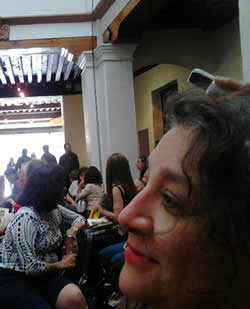
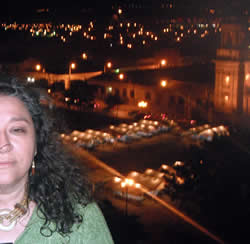
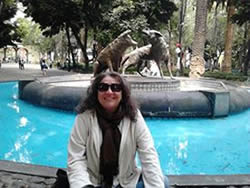
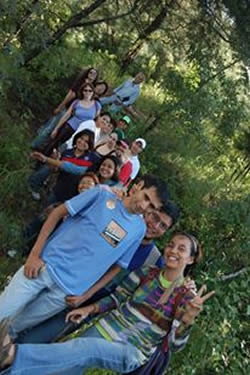
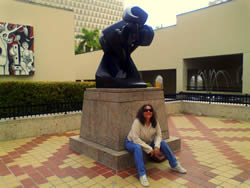
 Trudy is an American expat living in Guatemala. Blog description: A U.S. expat living and working off-and-on in Guatemala City.
Trudy is an American expat living in Guatemala. Blog description: A U.S. expat living and working off-and-on in Guatemala City.





